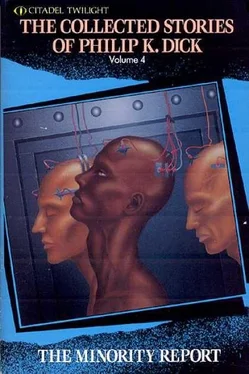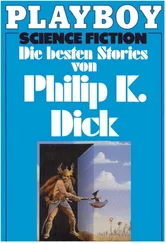"You were touching the frame of the thing," Pinario said excitedly. He grabbed the pliers himself and crouched down, fumbling for the lead. "Maybe if I wrap a handkerchief around it," he muttered, withdrawing the pliers and fishing in his pocket for a handkerchief. "Anybody got anything I can wrap around this? I don't want to get knocked flat. No telling how many -"
"Give it to me," Wiseman demanded, snatching the pliers from him. He shoved Pinario aside and closed the jaws of the pliers about the lead.
Fowler said calmly, "Too late."
Wiseman hardly heard his superior's voice; he heard the constant tone within his head, and he put up his hands to his ears, futilely trying to shut it out. Now it seemed to pass directly from the citadel through his skull, transmitted by the bone. We stalled around too long, he thought. Now it has us. It won out because there are too many of us; we got to squabbling…
Within his mind, a voice said, "Congratulations. By your fortitude, you have been successful."
A vast feeling pervaded him then, a sense of accomplishment.
"The odds against you were tremendous," the voice inside his mind continued. "Anyone else would have failed."
He knew then that everything was all right. They had been wrong.
"What you have done here," the voice declared, "you can continue to do all your life. You can always triumph over adversaries. By patience and persistence, you can win out. The universe isn't such an overwhelming place, after all…"
No, he realized with irony, it wasn't.
"They are just ordinary persons," the voice soothed. "So even though you're the only one, an individual against many, you have nothing to fear. Give it time – and don't worry."
"I won't," he said aloud.
The humming receded. The voice was gone.
After a long pause, Fowler said, "It's over."
"I don't get it," Pinario said.
"That was what it was supposed to do," Wiseman said. "It's a therapeutic toy. Helps give the child confidence. The disassembling of the soldiers" – he grinned – "ends the separation between him and the world. He becomes one with it. And, in doing so, conquers it."
"Then it's harmless," Fowler said.
"All this work for nothing," Pinario groused. To the bomb expert, he said, "I'm sorry we got you up here for nothing."
The citadel had now opened its gates wide. Twelve soldiers, once more intact, issued forth. The cycle was complete; the assault could begin again.
Suddenly Wiseman said, "I'm not going to release it."
"What?" Pinario said. "Why not?"
"I don't trust it," Wiseman said. "It's too complicated for what it actually does."
"Explain," Fowler demanded.
"There's nothing to explain," Wiseman said. "Here's this immensely intricate gadget, and all it does is take itself apart and then reassemble itself. There must be more, even if we can't -"
"It's therapeutic," Pinario put in.
Fowler said, "I'll leave it up to you, Leon. If you have doubts, then don't release it. We can't be too careful."
"Maybe I'm wrong," Wiseman said, "but I keep thinking to myself: What did they actually build this for? I feel we still don't know."
"And the American Cowboy Suit," Pinario added. "You don't want to release that either."
"Only the game," Wiseman said. "Syndrome, or whatever it's called." Bending down, he watched the soldiers as they hustled toward the citadel. Bursts of smoke, again… activity, feigned attacks, careful withdrawals…
"What are you thinking?" Pinario asked, scrutinizing him.
"Maybe it's a diversion," Wiseman said. "To keep our minds involved. So we won't notice something else." That was his intuition, but he couldn't pin it down. "A red herring," he said. "While something else takes place. That's why it's so complicated. We were supposed to suspect it. That's why they built it."
Baffled, he put his foot down in front of a soldier. The soldier took refuge behind his shoe, hiding from the monitors of the citadel.
"There must be something right before our eyes," Fowler said, "that we're not noticing."
"Yes." Wiseman wondered if they would ever find it. "Anyhow," he said, "we're keeping it here, where we can observe it."
Seating himself nearby, he prepared to watch the soldiers. He made himself comfortable for a long, long wait.
At six o'clock that evening, Joe Hauck, the sales manager for Appeley's Children's Store, parked his car before his house, got out, and strode up the stairs.
Under his arm he carried a large flat package, a "sample" that he had appropriated.
"Hey!" his two kids, Bobby and Lora, squealed as he let himself in. "You got something for us, Dad?" They crowded around him, blocking his path. In the kitchen, his wife looked up from the table and put down her magazine.
"A new game I picked for you," Hauck said. He unwrapped the package, feeling genial. There was no reason why he shouldn't help himself to one of the new games; he had been on the phone for weeks, getting the stuff through Import Standards – and after all was said and done, only one of the three items had been cleared.
As the kids went off with the game, his wife said in a low voice, "More corruption in high places." She had always disapproved of his bringing home items from the store's stock.
"We've got thousands of them," Hauck said. "A warehouse full. Nobody'll notice one missing."
At the dinner table, during the meal, the kids scrupulously studied every word of the instructions that accompanied the game. They were aware of nothing else.
"Don't read at the table," Mrs. Hauck said reprovingly.
Leaning back in his chair, Joe Hauck continued his account of the day. "And after all that time, what did they release? One lousy item. We'll be lucky if we can push enough to make a profit. It was that Shock Troop gimmick that would really have paid off. And that's tied up indefinitely."
He lit a cigarette and relaxed, feeling the peacefulness of his home, the presence of his wife and children.
His daughter said, "Dad, do you want to play? It says the more who play, the better."
"Sure," Joe Hauck said.
While his wife cleared the table, he and his children spread out the board, counters, dice and paper money and shares of stock. Almost at once he was deep in the game, totally involved; his childhood memories of game-playing swam back, and he acquired shares of stock with cunning and originality, until, toward the conclusion of the game, he had cornered most of the syndromes.
He settled back with a sigh of contentment. "That's that," he declared to his children. "Afraid I had a head start. After all, I'm not new to this type of game." Getting hold of the valuable holdings on the board filled him with a powerful sense of satisfaction. "Sorry to have to win, kids."
His daughter said, "You didn't win."
"You lost," his son said.
" What?" Joe Hauck exclaimed.
"The person who winds up with the most stock loses," Lora said.
She showed him the instructions. "See? The idea is to get rid of your stocks. Dad, you're out of the game."
"The heck with that," Hauck said, disappointed. "That's no kind of game." His satisfaction vanished. "That's no fun."
"Now we two have to play out the game," Bobby said, "to see who finally wins."
As he got up from the board, Joe Hauck grumbled, "I don't get it. What would anybody see in a game where the winner winds up with nothing at all?"
Behind him, his two children continued to play. As stock and money changed hands, the children became more and more animated. When the game entered its final stages, the children were in a state of ecstatic concentration.
"They don't know Monopoly," Hauck said to himself, "so this screwball game doesn't seem strange to them."
Читать дальше










